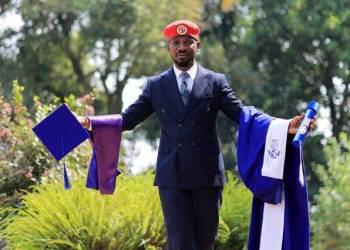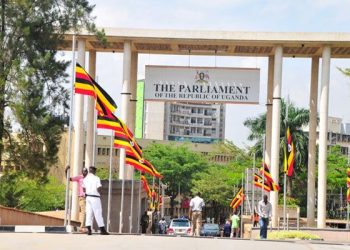The National Unity Platform (NUP) revised its constitution, reducing the authority of Robert Kyagulanyi, alias Bobi Wine, the party’s leader.
All party officials and flag bearers, including the party president, were subject to two, five-year term limitations.
This was decided upon at the party’s delegate conference, which was held last week in Kampala.
The constitutional review committee, led by Medard Ssegona, submitted suggestions for changes to the party constitution at the meeting, which was attended by more than 66% of the party’s members.
After a protracted, heated, and lively debate, the committee’s initial recommendations were modified and the new Constitution was approved.
The delegates conference will now consist of more than 500 members instead of the present 150 members, and the President and Secretary General will no longer be able to designate delegates.
The number of elected party leaders at the MP, mayor, and local government district chairman levels will determine this.
“The constitution imposes two five-year term limits on all party leaders as well as all elected leaders under the party flag,” the statement from the party read in part.
As a result, no one may serve as secretary general, party chairperson, or party president for more than two terms.
An individual is also limited to a maximum of two terms as a NUP member of parliament or councillor at the same level.
This clause will go into effect with the following election cycle of 2026.
But political observers have cautioned that if the party decides to implement this two-term limit for both elective and party leadership positions, the party may lose supporters as a result.
However, the party pointed out that a person can still serve as the party’s presidential flag bearer even if they are no longer the party’s president.
The party went on to say that while term limits do not apply to candidates who run for office at any level but are not declared victorious, they do so for those who succeed.
The term limit decision was made to foster democracy, although individuals can move on from previously held roles to a new post if they choose to continue serving, according to NUP spokesperson Joel Ssenyonyi.
“This constitution was made in 2004, so, it needed to match the times, it needed to match our aspirations and our way of looking at things democratically and has changed seeking leaders. One of those is to lessen the powers of the president,” he said.
“Because the constitution we have had provided for the president and secretary general nominating people to come for a delegate conference and voting about 50 of those. What that means is that if the president of the party is interested in making a certain change or whatever, the case might be he or she will have his way or her way by bringing people who have capacity to vote.So we thought that is not proper,” he added.
The modified Constitution also establishes party structures at all levels, from the local to the international.
From the village to the district, committees and conventions are established, and the district leadership is represented at the delegates conference.
The positions of party chairperson and deputy party chairperson are established under the Constitution and are chosen by the delegates’ conference.
Their duties include serving as conference chair, doing specific diplomatic tasks as directed, and generally overseeing senior leader unity and conflict resolution.
The Constitution offers a number of choices for candidate selection, including holding party primaries, screening candidates, or a combination of methods, given the hostile climate in which the opposition operates.
The constitution specifies the electoral colleges (Party structures) in charge of selecting flag bearers at various levels in the event that the party chooses to have primaries.
Certain provisions of the Constitution are difficult to change under the Constitution, particularly those that deal with term limits, how the National Executive Committee is elected, and party dissolution.
The Party’s Integrity Oath and Code of Conduct are attached to the Constitution.
The modified Constitution will now be sent to the organization that regulates political parties in compliance with the Political Parties and Organizations Act, 2005, and will begin operating after being gazetted.
































































